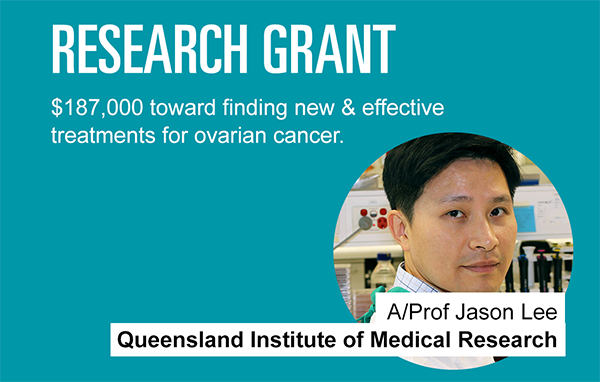Last year in Australia, there were an estimated 1,510 women who were newly diagnosed with ovarian cancer. Fewer than half (43%) of these women will survive for more than 5 years.
Unlike other cancers, ovarian cancer doesn’t get quite the same amount of attention and research funding, mainly because there are very few survival stories to tell, and few long-term advocates. However, it is clearly having an impact on so many women.

Recurrent, chemotherapy-resistant high-grade serous ovarian cancer (HGSOC) accounts for most deaths. Standard treatment for this type of cancer has not advanced and very little improvement in overall survival has been made.
Associate Professor Jason Lee and his team at Queensland Institute of Medical Research (QIMR) Berghofer hope to change this, with the help of over $187,000 from the OCRF in 2019.
Understanding ovarian cancer cells
Having researched cancer epigenetics for many years, Jason has gained extensive experience with many different types of cancer cells. Epigenetics refers to how environmental factors turn genes "on" or "off". These factors do not change the DNA sequence, but change how cells "read" genes.
“Compared to normal cells, ovarian cancer cells have a higher level of G9a protein,” A/Prof Lee says, “This causes cancer cells to grow fast, move more and makes ovarian cancer cells more resistant to chemotherapy. If we inhibit the G9a function, cancer cells grow more slowly and are ultimately killed through a process called apoptosis – programmed cell death.”
Finding new & effective treatments
The Ovarian Cancer Research Foundation is one of the largest not-for-profit funders of ovarian cancer research in Australia.
Since 2001, we have given more than $16.5 million to Australian researchers in order to make serious inroads into understanding this insidious disease, developing an early detection test and finding new treatments.
With his expertise, the OCRF chose to back his research to develop a new drug to overcome treatment-resistant ovarian cancer, and to sensitise tumours to chemotherapy.
“This will not only reduce the harsh side-effects of chemotherapy, but also decrease the likelihood of patients developing chemotherapy resistance,” says Jason.
Research gives us hope
“The researchers we have funded in 2019 are taking innovative approaches to tackling ovarian cancer from a range of different angles,” OCRF Chief Executive Lucinda Nolan says.
We believe that funding Jason’s research is vital in providing hope and personalised treatment options aimed at extending the lives of women currently fighting ovarian cancer.
However, critical research like Jason’s cannot occur without generous gifts from the community.
Every gift takes us closer to a cure for ovarian cancer. Donate today to save all women from this insidious disease.